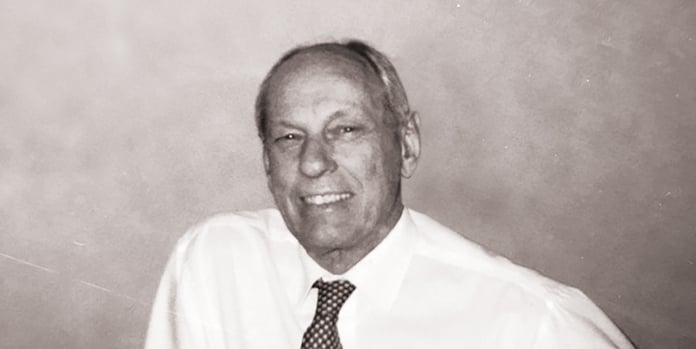Dr Nigel Gray AO (OM 1946) had an intrinsic desire to improve peoples’ lives and this led to him dedicating his life to cancer control.
In an age when smoking was widely accepted, suntanning was the norm and screening for breast and cervical cancers was rare, and despite significant opposition, Nigel spearheaded the introduction of cancer prevention practices on a global scale.
After Nigel’s death in 2014, the Medical Journal of Australia wrote “He [is] probably responsible for preventing more disease than any other Australian.”
A “formidable opponent” takes on big tobacco
Nigel’s early medical career was at Melbourne’s Fairfield Infectious Diseases and Royal Children’s Hospitals, ultimately becoming Deputy Director and Acting Director of the Children’s Hospital before being appointed to the role of Director of Cancer Council Victoria in 1968, a position he would hold until 1995.
At that time, Nigel’s Anti-Cancer Council (as it was called then) was a small group attempting to create huge change. Over half of all Australian males smoked, but Nigel was undeterred. He took the tobacco companies head on publicly refuting aspects of their research and resultant claims. As one British American Tobacco memorandum put it: “Dr Gray seems a formidable opponent.”
This turned out to be no understatement. By 1971, Australians were seeing their first antismoking advertisements featuring high profile people as diverse as Warren Mitchell as his working class character Alf Garnett and Nobel Prize recipient Sir Macfarlane Burnet.
When television stations refused to air some of the ads, presumably due to, at least in part, pressure from a major advertiser – tobacco companies – Nigel went to the press intentionally creating a firestorm and putting pressure on the government to take action.
In 1972, the broadcasting of tobacco advertising was banned in Australia. However, print advertising continued. Nigel’s advocacy was unrelenting.
In December 1989, the Smoking and Tobacco Products Advertisements (Prohibition) Act was passed in Australia banning most forms of tobacco advertising including those in print and on billboards. Then, in 1992, after decades of lobbying by Nigel, the federal government passed the Tobacco Advertising Prohibition Act 1992, phasing out tobacco advertising in Australia during telecasts of sporting events.
Under Nigel’s leadership, research and publication education programs followed, and the first comprehensive policy approach to tobacco control on a global scale through Nigel’s role as President of the Union for International Cancer Control was established.
“His approach when working with the tobacco companies was always data driven and measured,” says Nigel’s daughter Penny Gray. “He was always interested in the bigger picture. He never went the person. He always went the ball.”
Another of Nigel’s initiatives, the hugely successful “Slip! Slop! Slap!” campaign was introduced in 1981 to combat the high rates of skin cancer in Australia. Again, educational programs and policy reform accompanied the crusade.
He led the formation of VicHealth, a preventative health education organisation, as well as the introduction of the National Cervical Screening Program in 1991 and breast cancer screening programs.
“Credibility was incredibly important to him,” adds Nigel’s daughter Kirsten Gray. “He knew how important it was to show tolerance for different points of view, and that intolerance might suggest a gap in his reasoning so he always maintained that broad-minded approach, while keeping the facts of the situation close at hand.”
Crossing party lines for a greater cause
Celebrating Nigel’s long and successful career, Cancer Council Victoria noted this commitment to clear, scientific thinking, along with his “legendary debonair approach”.
“Dad was incredibly creative, and he could talk to people at any level of society,” says Penny. “He was a member of the Melbourne Club, where he could meet the people he needed to have on side to create change, and at the same time he would have us selling raffle tickets outside every TAB in Melbourne to support the Cancer Council, and he would start a lot of conversations there, too.”
“Dad’s mentor, Dr Bill Keogh, saw his persuasiveness and ability to communicate, and Bill was the one who pushed Dad to take on the running of Cancer Council Victoria,” adds Kirsten. “Dad could walk across party lines, and he was an enthusiast by nature. I think that enthusiasm explains his ability to stay engaged in his 27 years as Director of Cancer Council Victoria—he was always completely committed to whatever he was doing.”
“I was well-mentored and lucky,” Nigel said in the late 2000s. “The world was a pretty easy place for a young man who missed the War by a whisker of age.”
He was still an active member of the World Health Organisation’s advisory committee on tobacco product regulation until his death. Today, Cancer Council Victoria continues to play a crucial role in public health, and Australia has one of the lowest smoking rates of any OECD country.
“Dad had a strong sense of the greater good, no matter how unpopular pursuing it made him,” says Penny Gray. “The way he saw it, there was always more to do.”



